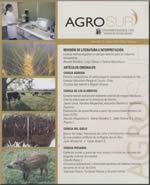EVALUATION OF A QUILLAJA SAPONARIA SAPONIN EXTRACT FOR CONTROL OF POWDERY MILDEW OF WHEAT AND SQUASH
Main Article Content
Abstract
Powdery mildew are important diseases in Chile, especially on wheat and cucurbit crops, and their management mainly depends on the use of chemical fungicides. However, new control alternatives have been developed, including extracts of quillay (Quillaja saponaria). In this study three dosages of saponins extracted from quillay (QL 1000®, Natural Response S.A., Quilpué, Chile) were evaluated for their effect on wheat and squash powdery mildew. For comparison, AQ-10® (Ampelomyces quisqualis), Serenade® (Bacillus subtilis), sulfur, and a standard chemical fungicidal mixture of azoxystrobin plus propiconazol/ fenpropidin were used. To evaluate the control efficacy of the saponins against Blumeria graminis f.sp. tritici, an experiment on wheat was conducted in humid chambers in a greenhouse. QL 1000® at a dose of 100-ppm of saponins exhibited a control level statistically similar to AQ-10®: (44% and 31%, respectively). Serenade® showed a control level comparable to that obtained with a standard chemical fungicide mixture (75 vs. 80%). The experiment to evaluate the control efficacy of saponins against Golovinomyces cichoracearum and Podosphaera fusca in squash was carried out under fied conditions. In this case 200 ppm of QL 1000® saponins, Serenade® and sulfur exhibited control levels of 51%, 50% and 70%, respectively. In these tests, for both wheat and squash, spray applications of QL 1000® saponins provided powdery mildew control levels comparable to those obtained using AQ-10® and Serenade.

